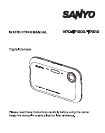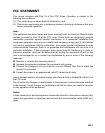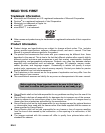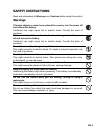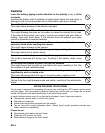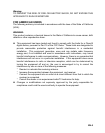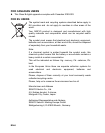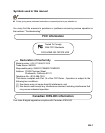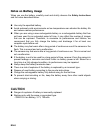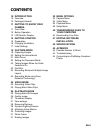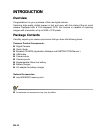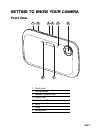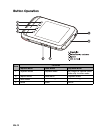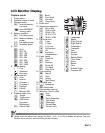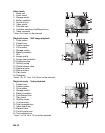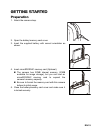
EN-4
Cautions
NOTES ON USING TOUCH PANEL
Touch panel is designed for operating the camera by touching the LCD monitor (touch panel)
with your finger. You can operate by directly tapping the monitor with your finger. Do not press
on the LCD monitor with hard pointed tips, such as ball point pens.
In such situations below, even if you tap the touch panel, it won’t have any reaction:
Operate the camera when it is still in the pouch.
Tap with your fingernail.
Some other things were dropped onto the screen.
Tap on the liquid crystal protection sheet. (Some liquid crystal protection sheets may
impair visibility or operability.)
Please do not:
Operate the touch panel with wet finger.
Press the LCD monitor too hard.
Stick adhesive things to the touch panel.
Insert the battery paying careful attention to the polarity (+ or –) of the
terminals.
Inserting the battery with its polarities inverted might cause fire and injury, or
damage to the surrounding areas due to the battery rupturing or leaking.
Do not fire the flash close to anyone’s eyes.
This might cause damage to the person’s eyesight.
Do not subject the LCD monitor to impact.
This might damage the glass on the screen or cause the internal fluid to leak.
If the internal fluid enters your eyes or comes into contact with your body or
clothes, rinse with fresh water. If the internal fluid has entered your eyes,
consult a physician to receive treatment.
Camera is a precision instrument. Do not drop it, strike it or use
excessive force when handling the camera.
This might cause damage to the camera.
Do not use the camera in humid, steamy, smoky, or dusty places.
This might cause fire or electric shock.
Do not remove the battery immediately after long period of continuous use.
The battery becomes hot during use. Touching a hot battery might cause
burns.
Do not wrap the camera or place it in cloth or blankets.
This might cause heat to build up and deform the case, resulting in fire. Use
the camera in a well-ventilated place.
Do not leave the camera in places where the temperature may rise
significantly, such as inside a car.
This might adversely affect the case or the parts inside, resulting in fire.
Before you move the camera, disconnect cords and cables.
Failure to do this might damage cords and cables, resulting in fire and electric
shock.



